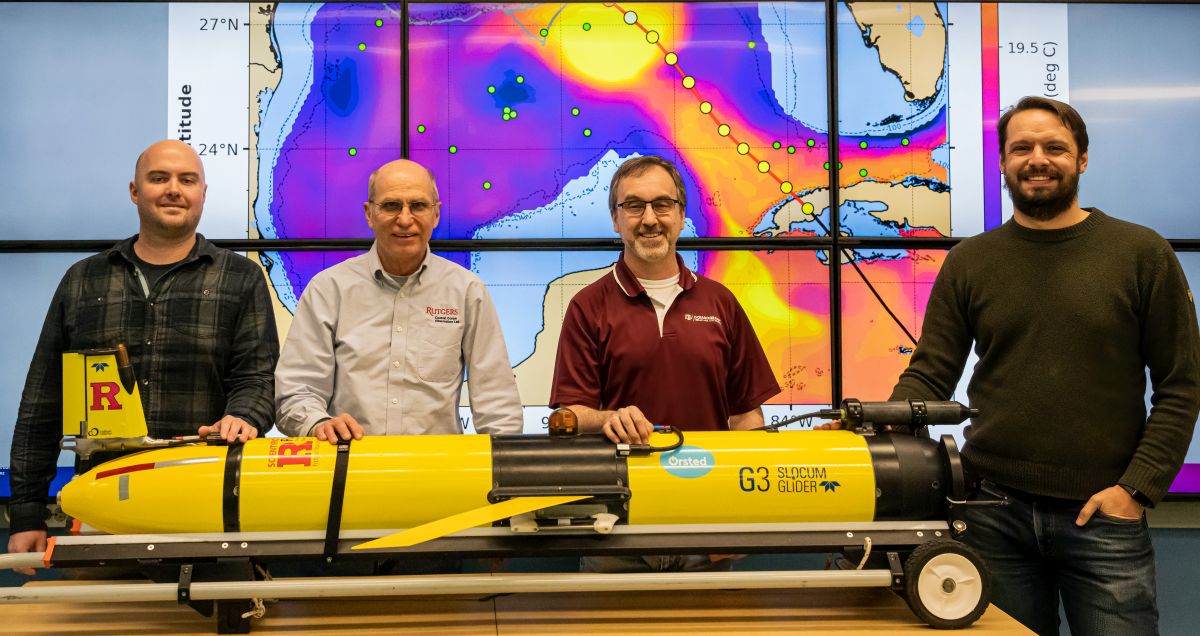
L-R: Michael Smith, research staff at Rutgers; Scott Glenn, Rutgers Board of Governors Professor of Marine and Coastal Sciences; Steve DiMarco, professor, Texas A&M University; and Travis Miles, assistant professor at Rutgers, who are part of the collaborative team involved in the UGOS project.
Scott Glenn, Rutgers Board of Governors Professor of Marine and Coastal Sciences, is the Rutgers lead, and Travis Miles, assistant professor in the Department of Marine and Coastal Sciences, is the Rutgers co-PI, on a $5.4 million award to establish the Gulf Consortium for Offshore Risk Reduction Engaging Stakeholders (GulfCORES).
GulfCORES is one of three consortia to receive a five-year, $22 million award from the Gulf Research Program (GRP) of the National Academies of Sciences, Engineering, and Medicine for phase three of the Understanding Gulf Ocean Systems (UGOS) program.
Director and project lead of GulfCORES, Steven DiMarco, professor in the Department of Oceanography at Texas A&M, is currently on sabbatical at Rutgers for several weeks.
According to DiMarco, GulfCORES will complement and enhance existing modeling and observational capabilities by providing adaptive sampling observations from glider, float, and drifter platforms. The consortium will also actively engage stakeholders and industry to ensure sustainable transitions to operations that support end-users. Among the goals is to execute an observational program to support numerical modeling, and develop a plan to incorporate study outputs into existing operational agency and industry activities.
An international consortium, GulfCORES includes scientists from eight partner institutions, Rutgers University, University of Miami, University of South Florida, University of Southern Mississippi, Woods Hole Group Inc., Texas A&M University – Corpus Christi Harte Research Institute, Universidad Nacional Autonoma de Mexico (UNAM, Puerto Morelos, Mexico), and EnseñadaCenter for Scientific Research and Higher Education (CICESE, Enseñada, Mexico). In addition, there are four collaborating institutions that include Gulf of Mexico Coastal Ocean Observing System (GCOOS), Ocean Sierra, LLC, CODAR, Inc., and Shell Exploration Company.
Along with GulfCORES, the projects, “Advancing Gulf of Mexico Operational Forecasting with Application to Fisheries, Industry Safety, and Natural Hazards (GOFFISH)” and “An Operational System Using Real-time Subsurface Observations to Improve Loop Current Forecasts,” were also funded under UGOS’ third phase.
The three consortia will work collaboratively to apply existing and emerging data to improve operational forecasting of the Gulf of Mexico ocean dynamics, including the Loop Current and its eddies. Enhanced predictions of these currents and eddies will help avoid risky conditions for oil drilling and production, thereby reducing risks to offshore workers. They will also help improve oil spill response, weather forecasting, and the sustainable management of the Gulf’s rich fisheries resources.
According to UGOS, the deep and fast-moving Loop Current is of interest to industry and weather forecasters, as well as to the scientific community due to sometimes unpredictable changes in its velocity, temperature, and position. Its deep, warm eddies can supply heat to tropical storms moving over them, allowing the storms to rapidly intensify. This was apparently the case last year when Hurricane Ida quickly grew from a Category 1 to a Category 4 hurricane before it made landfall. Further, if the Loop Current had behaved differently during the Deepwater Horizon oil spill, it could have pushed oil beyond the Gulf, causing damage to a much larger area.
Scientists from universities throughout the Gulf region and from other prominent oceanographic research institutions in the U.S. and Mexico will bring together satellite measurements and data collected from advanced instruments that are drifting, gliding, or moored in the Gulf. This includes the most comprehensive observations of ocean water moving from the Caribbean Sea into the Gulf through the Yucatan Strait, a critical entry point located between Mexico and Cuba.
The three consortia will work together to incorporate all these observations into sophisticated computer models to advance understanding and forecasting skill. They will work closely with organizations that provide operational forecasts for the offshore industry and in federal agencies, including the U.S. Naval Research Laboratory and National Oceanic and Atmospheric Administration.
The National Academies’ Gulf Research Program is an independent, science-based program founded in 2013 as part of legal settlements with the companies involved in the 2010 Deepwater Horizon disaster.

